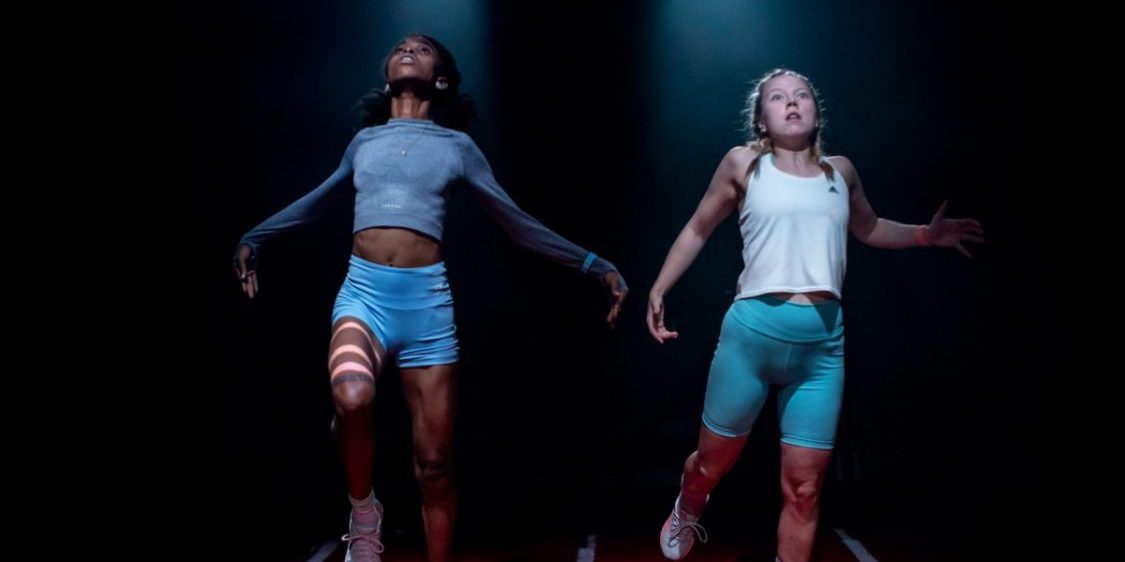Like Bernard Shaw a century ago, Ella Road likes to take important and difficult social issues, place them in the dramatic spotlight, and examine every facet and angle unflinchingly. This is a rare impulse in contemporary writing and one that really pays off in this her most recent work. In ninety minutes of short snappy scenes all punctuated by continuous athletic exercise or simulated running we get to explore the world of women’s athletics both on the track and behind the scenes. Sophie (Charlotte Beaumont) is an experienced and established athlete from a comfortable middle-class background, with sponsorship already sewn up. Ann (NicK King) has come to middle-distance running through a more arduous and hard-scrabble route, with racism, parental divorce and shortage of money all presenting obstacles to her clear and obvious talent.
The snappy dialogue and developing empathy between the two are entirely compelling, and director Monique Touko keeps us visually engrossed by means of Naomi Dawson’s economical set – white track lanes on a red background with a couple of climbing frames facing one another. There is hardly a still moment as exercise routines and stylised synchronised racing mark the progress of these athletes towards international competition and success and closer friendship and – ultimately – rivalry. The physical and emotional costs of such full-on pressure are very well conveyed, as are the sacrifices required of them by the team ethic and the overbearing all-male coaching staff.
About an hour in the action is wrenched in a wholly new direction as Ann’s emerging supremacy on the track is brought to an abrupt halt by an unexpected test result which places not just her career but her relationship with Sophie into turmoil. Road forces us to focus on the ethical dilemmas involved in testing for testosterone levels in women athletes, raising troubling questions as to who gets to decide the circumstances and threshold for female identity, especially in a sport where so many decisions are still taken mainly by men. Sophie and Ann’s relationship is inevitably affected through a series of emotionally raw encounters written up with deftly unsparing dialogue that avoids easy and pat resolutions, even when Sophie herself is revealed to be a victim of the system in a different way. As the late Stephen Sondheim once said: ‘All really first-rate plays in the end have something in them that is not resolved.’ So it is here.
If this were a musical composition, you would say that there is a bit too much exposition and not quite enough development. In other words, there are one too many trackside conversations setting the scene and not quite enough time remaining to work through the emotional consequences and intellectual repercussions of the tensions released at the climax. Moreover, there are other plot lines – such as Sophie’s mother’s cancer diagnosis – which come and go in the narrative without full development or incorporation.
But such are the compelling performances from the two actors that for the duration of the play you are entirely caught up in the moment. Beaumont combines a confident exterior swagger with hints of insecurity and self-doubt that gradually widen as the play unfolds. King combines a calm and poise and control which makes it all the more devastating to watch when this persona is collapsed by events, and you understand the reasons for that carefully constructed persona. In each case we are made to feel powerfully how running has offered them both fulfilment and self-destruction simultaneously. We are left asking whether the costs of elite sport, as presently constructed, and especially to women, can be justified.
In closing one must mention the excellent lighting and sound designs by Matt Haskins and Giles Thomas which provide us with all the context we need, whether snatched trackside moments, glitzy interviews, stopwatch standoffs, stadium highlights or just a doorstep in Hounslow.
This is a 4-star play boosted by 6-star performances, so I shall split the difference and settle on a 5-star rating.

